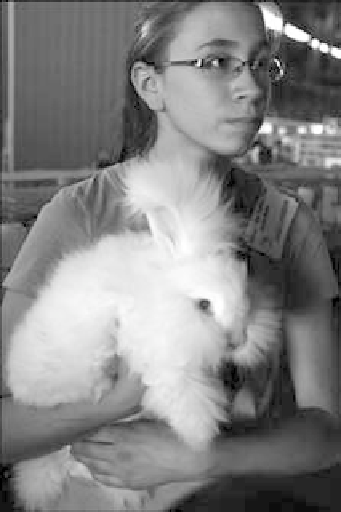Agriculture Reference
In-Depth Information
Signs and Prevention of Illness and Disease
Many diseases can be avoided by good-quality food, daily care and maintenance, and proper hous-
ing for your rabbits. However, just as with any animal, sometimes your rabbits can get sick. That's
why daily checks on your rabbits' demeanor, not just filling food and water dishes, are important.
Handling your rabbits often will make it easier to tell when your rabbit is sick. This girl enjoys her Angora
rabbit as a fun 4-H project, as well as a beloved pet.
(Photo courtesy of Steven Depolo)
Ear mites.
Although they are especially common in overcrowded or neglected rabbits, any rabbits
can contract these annoying pests. When you see signs of ear mites, you need to take action right
away to prevent disease spreading and complete infestation. Mineral oil can sometimes smother
out the mites if the infestation isn't too far advanced. Otherwise, a prescription ointment may be
needed from your veterinarian. You'll need to thoroughly clean any cage with a mite infestation, as
well as the entire hutch area. Mites are notorious for hiding the crevices of a wood hutch and being
hard to completely eradicate.
Enterotoxemia.
This potentially fatal problem that can occur with rabbits happens when their
digestive balance is disturbed. This can happen when too much fresh fruit or greens are given at
one time. Sometimes you may notice signs of diarrhea in your rabbit and be able to give them
more hay and uncooked, whole oats, while other times you may lose your rabbit before you ever
saw anything wrong. Any changes in feed should be made slowly, especially during already stressful
times such as weaning, breeding, or moving to a new home.














